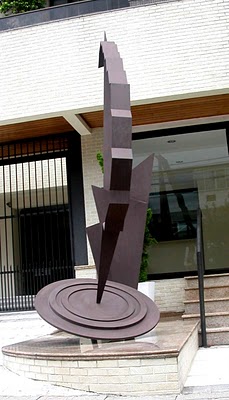
A Surrealist influence in
Cactus,( lines 13-20)
Here
,when the flanks of the city were made as green
as moonbeams glancing through the forests,
when still they cooled the hillsides of Iarive
crouched like bulls after food,
upon these rocks, too steep for goats,
they drew apart to guard their springs.
Lepers in finery of flowers.
Romantcism (France, 19th Cent.) influenc
Pomegranate, (lines 9-13) perhapS Keats??????
Its taste will be sweeter,
because it was pregnant with desire
And with fearful love and scented blossoms -
Pregnant by the love sun.
Three day breaks, Part III,( lines 1-10 (of III parts))
All the stars are melted together
in the crucible of time,
then cooled in the sea
and turned into a many-faceted stone-block.
A dying lapidist, the Night, setting to work with all her heart
and all her grief to see her millscrumbling, crumbling,
like ashes in the wind,
cuts with what living care the prism.
A Reflection on Merina (Ethnic Group) Culture
Two Old Merina Songs, excerpt from Part II (of II parts)
... my cousin, I have scarcely any lovers for my lovers
areno more than seven; the first is the lover that cuts my
nails; the second is the lover who takes the place of the one
withus in the house, when I am away from home; the third
takes her place in an emergency; the fourth is the lover
who
follows me with her eyes when I go away; the fifth is the
lover who comes to meet me when I return; the sixth is
the lover sustains my life like rice; the seventh is the
lover who does not mix with the crowd andeven when she
happens to be amongst them always knows how to
make
herself distinguished.
And you witness of his daily suffering
and of his endless task;
you atch his thunder-riddled
agony until the battlements of the East re-echo
the conches of the sea -
but you pity him no more
and do not even
remember that his sufferings begin
again
each time the sun capsizes.
(from Traduit de la nuit, 1935 )
JEAN-JOSEP
 H RABÉARIVELO
H RABÉARIVELOPassionate and restless, drifted from on job to another, and suffered from drug addiction and depression. Rabearivelo took his own life at the age of 36; on June 22, 1937 by poisoning himself . Various reasons have been given for his suicide, including the colonial administration's decision to send a group of basket-weavers instead of him to France to represent the colony. One of Africa's most important French-language poets, a prominent figure in the literary revival known as the Mitady ny Very which swept Madagascar in the 1930s. Rabearivelo wrote both in Malagasy and in his own unique version of imperfect French.
Born in Antananarivo (Tananarive), capital of Madagascar. His mother, who married a tailor, was an aristocrat, related to the royalty of the largest Malagasy ethnic group, the Merina people. In 1895 Malagasy armed forces had been defeated by the French, and the new administration led to the pauperization of most of the Merina royalty. .
Rabearivelo was educated by his uncle, ( sent to the Ecole des Freres des Ecoles Chretiennes - Andohalo, and after to the Collrge Saint-Michel in Amparibe. Left schooling at the thirteen continued to read widely the classics western. He was secretary and interpreter of the head of the Canton of Ambatolampy, and then returned to Tananarive. Rabearivelo worked in odd jobs, but ended as a proof-reader at the printing press in Imerina until his death. Razafitrimo, and have five children .A terrible blow for him was the death of his youngest daughter blow for In Un conte de la nuit, a short story, he recounts the family tragedy.
Rabearivelo's mother encouraged him to write at the age of 20 he published his first poems . In 1923 the international revue Anthropos accepted an article of him on the poetry of Madagascar. He contribute to journals in his own country, in the neighboring Mauritius, and in Europe. Rabearivelo's early poems were influenced by French Symbolist poets. In 1930s he lauched his own journal, Capricorne, in 1931 he was accepted into the Academie Malgachethe .Rab*arivelo never got a higher-paying job from the administration which he always hoped.
. In the 1910s several nationally prominent writers had been imprisoned, Malagasy- language writing was restricted, but memories of independence were still fresh under the colonial rule. In his early collections Rabearivelo's recurring theme was exile, the journey away from the native land, referring to the loss of independence. When all text written in French were considered to belong to French literature, Rabearivelo supported bilingual works and proposed that 'Malagasy literature' would recognize French-language texts composed by the Malagasy.
Like Baudelaire Rabearivelo was too much of an aesthetician to join the cadres of militant poets. He created his own world,-strange and mythical-,which was shadowed by visions of suffering and death, teeth marks of colonized civilization. Cosmos was for Rabearivelo full of sad beauty, wandering tribes, and bodies in perpetual mutation. His plays, Imaitsoanala, Fille d'oiseau (1935) and Aux portes de la ville (1936), focused on rituals and folklore and carefully avoided any reference to politically inflammable issues. On the other hand, none of his critical works were published in his lifetime.

I know a child, a prince in God's kingdom
Who would continue the tale:
Who would continue the tale:
'Fate too pity on the lepers
And told them to plant their flowers
And guard their springs afar from man's cruelty.'
(from Presque-songes, 1934)









3 comments:
I shall have to research this RABÉARIVELO a bit. On the strength of what you've posted here, he's a bit tasty! Thanks for introducung us!
Dave, I also have investigates it more, I am very interested in his poetry.
In theory I' d like to write like this too - taking time and real effort to make a good article... but what can I say... I procrastinate alot and never seem to get something done.
Post a Comment